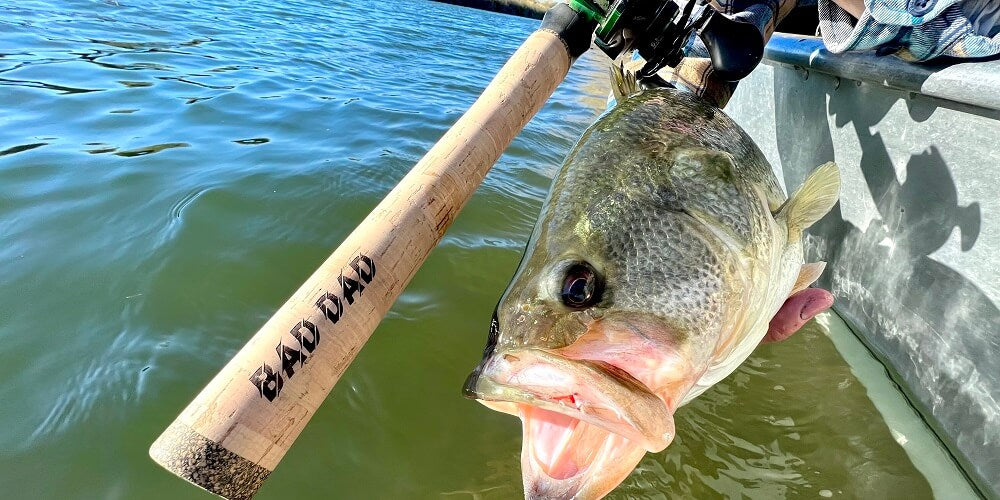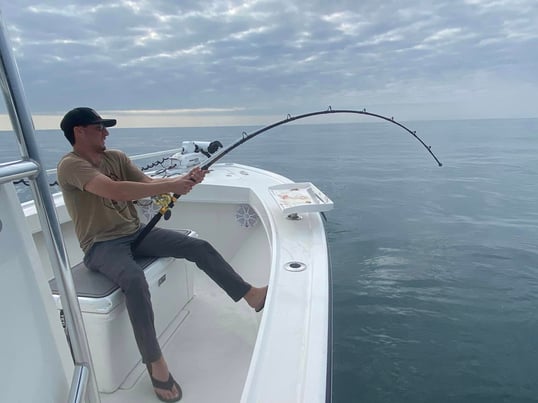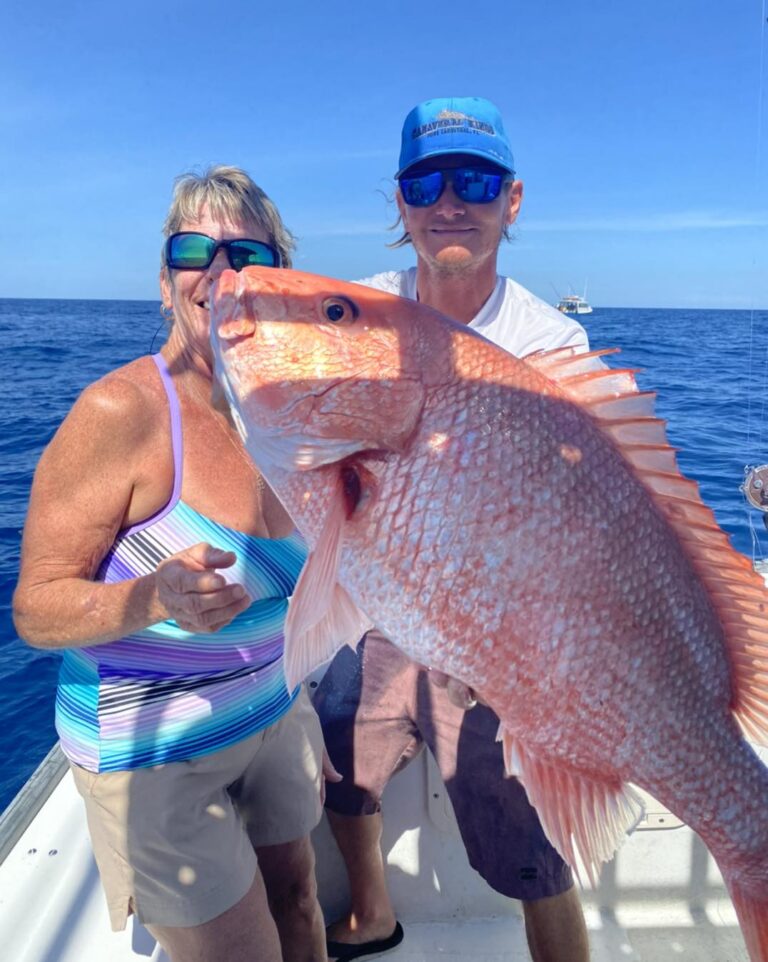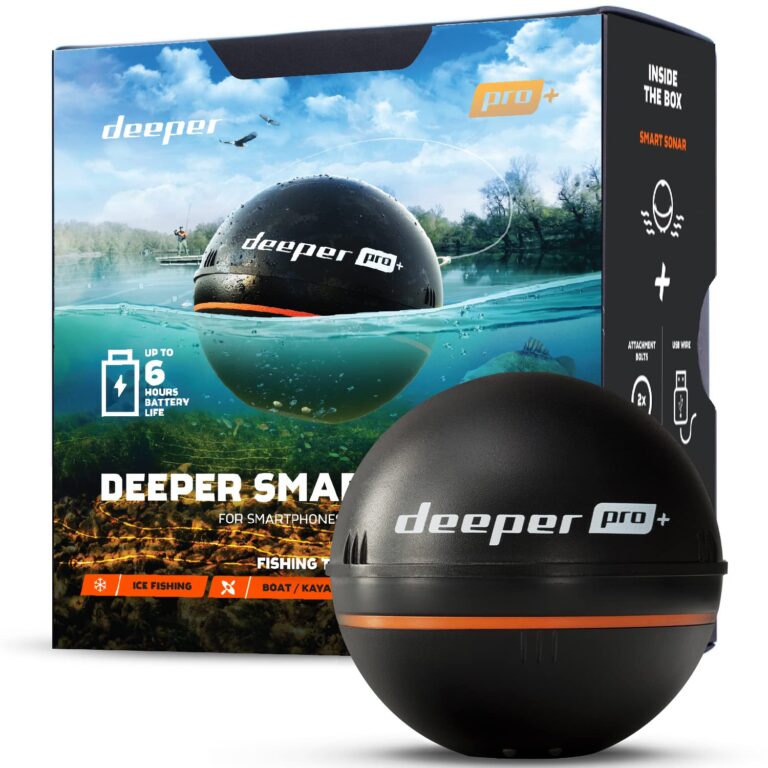Choosing a deep sea fishing reel is a crucial decision. Consider factors like reel type, material, and gear ratio to make an informed choice.
Deep sea fishing can be an exhilarating and rewarding experience, but it requires the right equipment, including a suitable fishing reel. A deep sea fishing reel is specifically designed to handle the challenges and demands of offshore fishing, where larger and stronger fish are often encountered.
With so many options available, choosing the right reel can seem overwhelming. However, by considering factors such as the reel type, material, and gear ratio, you can make an informed decision that will enhance your fishing experience and increase your chances of success. We will walk you through the key considerations to help you choose the perfect deep sea fishing reel.

Credit: gomexus.com
Understanding The Basics Of Deep Sea Fishing Reels
Deep sea fishing requires the use of specialized equipment, and one of the most important tools you’ll need is a high-quality fishing reel. A fishing reel is the device mounted on the fishing rod that holds and releases the fishing line.
It plays a crucial role in your success as an angler in deep sea fishing. To choose the right deep sea fishing reel, it’s essential to understand the basics. In this section, we will explore the different types of fishing reels, their pros and cons, and the factors to consider when selecting a reel.
Different Types Of Fishing Reels
There are several types of fishing reels available, each designed for different fishing techniques and target species. Understanding the differences between these reel types will help you make an informed decision when choosing a deep sea fishing reel. Here are the main types:
- Spinning reel: Spinning reels are the most commonly used reels for deep sea fishing. They are versatile, easy to use, and suitable for both beginners and experienced anglers. These reels have a fixed spool and use a bail to release the fishing line.
- Baitcasting reel: Baitcasting reels are known for their precision and accuracy. They are popular among experienced anglers who prefer casting heavier baits and lures. Baitcasting reels offer better control over the line, but they require some practice to master.
- Conventional reel: Conventional reels, also known as trolling reels, are designed for offshore fishing. They are built to handle larger fish and heavier lines. These reels have a level-wind mechanism that distributes the line evenly on the spool.
- Electric reel: Electric reels are specialized reels that use motor power to retrieve the fishing line. They are commonly used for deep sea fishing when dealing with heavy loads or in situations where manual reeling becomes tiring.
Pros And Cons Of Each Reel Type
Each fishing reel type has its own advantages and disadvantages. Here’s a closer look at the pros and cons of each reel type:
- Spinning reel:
- Pros:
- Easy to learn and use, suitable for beginners
- Versatile, can handle a wide range of fishing situations
- Less likely to backlash or tangle the line
- Cons:
- Not ideal for heavy baits or lures
- May have limited line capacity compared to other reel types
- Baitcasting reel:
- Pros:
- Offers better accuracy and control during casting
- Can handle heavier lines and larger fish
- Allows for precise lure presentation
- Cons:
- Requires practice to master the casting technique
- More prone to backlash and line tangles
- Conventional reel:
- Pros:
- Designed for offshore fishing and handling larger fish
- Offers high line capacity for deep sea fishing
- Smooth reeling action and drag system
- Cons:
- Requires some skill to operate efficiently
- Heavier and bulkier compared to other reel types
- Electric reel:
- Pros:
- Provides assistance for reeling in heavy loads
- Reduces fatigue during long fights with big fish
- Allows for precise control over the line retrieval speed
- Cons:
- Expensive compared to other reel types
- Requires an external power source
Factors To Consider When Choosing A Reel
When selecting a deep sea fishing reel, consider the following factors:
- Target species: Determine the size and type of fish you plan to target as different reel types are better suited for specific species.
- Fishing technique: Consider the fishing technique you’ll be using, such as trolling, bottom fishing, or casting, as this will influence your reel selection.
- Line capacity: Ensure that the reel has enough line capacity to accommodate the fishing line weight and length required for deep sea fishing.
- Gear ratio: The gear ratio determines the speed at which the fishing line is retrieved. Choose a gear ratio that suits your fishing needs.
- Build quality and durability: Look for reels made with high-quality materials that can withstand the harsh conditions of deep sea fishing.
- Budget: Consider your budget as fishing reels vary in price range. Strike a balance between quality and affordability.
Understanding the basics of deep sea fishing reels is essential for making an informed decision. Consider the different reel types, their pros and cons, and the factors mentioned above to select the most suitable reel for your deep sea fishing adventures.
Happy fishing!
Evaluating Key Features For Deep Sea Fishing Reels
Durability And Construction
When it comes to deep sea fishing reels, durability and construction are two key features that you need to carefully evaluate. Here are some important points to consider:
- Material: Look for reels made from sturdy and corrosion-resistant materials such as stainless steel or aluminum. These materials will ensure that your reel can withstand the harsh saltwater environment.
- Frame: A solid frame is essential for a durable reel. Opt for reels with reinforced frames that can handle the pressure and stress of deep sea fishing.
- Sealing: Deep sea fishing reels should have proper sealing mechanisms to prevent water intrusion. Look for reels with features like sealed ball bearings or waterproof seals to keep out saltwater and debris.
- Handle: Choose a reel with a comfortable and ergonomic handle. This will ensure that you have a good grip even when battling with large fish.
- Weight: Consider the weight of the reel. While you want a solid and durable reel, you don’t want something that’s too heavy and will tire you out during long fishing trips.
Gear Ratio And Line Capacity
The gear ratio and line capacity of a deep sea fishing reel are crucial for a successful fishing expedition. Here’s what you should know:
- Gear ratio: The gear ratio represents the number of times the spool rotates for each turn of the reel handle. A higher gear ratio means faster retrieval speed, which is beneficial when dealing with big and fast fish. Look for reels with gear ratios between 4:1 and 6:1 for deep sea fishing.
- Line capacity: Deep sea fishing often requires heavy lines with larger diameters. Ensure that the reel you choose can accommodate the line capacity needed for your fishing style. Consider the line capacity in terms of both monofilament and braided lines.
Drag System And Power
The drag system and power of a deep sea fishing reel play a vital role in landing those trophy fish. Here’s what you need to know:
- Drag system: Look for reels with a smooth and reliable drag system. The drag should be capable of applying consistent pressure and smoothly releasing line when a fish is fighting. Consider drag systems with multiple drag washers or carbon fiber drags for better performance.
- Power: Deep sea fishing requires reels with sufficient power to handle large and powerful fish. Choose reels with higher line ratings and strong gears to ensure that you can handle the pressure of reeling in big catches.
Remember, when choosing a deep sea fishing reel, prioritize durability, evaluate the gear ratio and line capacity, and assess the drag system and power. By considering these key features, you’ll be well-equipped for an exciting and successful deep sea fishing adventure.
Selecting The Right Deep Sea Fishing Reel For Your Needs
Deep sea fishing can be an exciting adventure for anglers of all skill levels. However, choosing the right fishing reel is crucial to ensure a successful and enjoyable experience. With a wide range of options available, it can be overwhelming to navigate through the choices.
Here are some key factors to consider when selecting the right deep sea fishing reel for your needs:
Matching The Reel To Your Fishing Style
When choosing a deep sea fishing reel, it’s essential to consider your fishing style and the type of fish you’ll be targeting. Different reels are designed for specific fishing techniques, so matching the reel to your fishing style is crucial.
Here are some points to keep in mind:
- Baitcasting reels: Ideal for experienced anglers who prefer precision casting and more control over their line.
- Spinning reels: Perfect for beginners or anglers who want an easy-to-use reel. Spinning reels offer a reliable and versatile option for different fishing techniques.
- Trolling reels: Designed specifically for trolling, these reels can handle larger fish and heavy-duty lines. They are commonly used for offshore fishing or targeting big game fish.
Considering Your Budget And Skill Level
Your budget and skill level are essential considerations when selecting a deep sea fishing reel. While it can be tempting to invest in the most expensive reel on the market, it may not always be necessary. Here are some factors to keep in mind:
- Budget: Determine how much you’re willing to spend on a fishing reel. There are options available for every budget, so it’s important to set a realistic limit.
- Skill level: If you’re a beginner, opt for a reel that is easy to use and requires minimal maintenance. Experienced anglers may prefer more advanced features and higher-end reels.
- Durability: Consider the durability of the reel. Cheaper reels may not withstand the demanding conditions of deep sea fishing, so it’s important to strike a balance between price and quality.
Reading Reviews And Seeking Expert Advice
Before making a final decision, it’s always beneficial to read reviews and seek advice from experts or experienced anglers. Here are some tips to guide you:
- Online reviews: Read reviews from reputable sources to gain insights into the pros and cons of various deep sea fishing reels. Pay attention to the feedback regarding durability, performance, and ease of use.
- Expert advice: Talk to local fishing experts or visit specialized fishing stores to get personalized guidance. They can recommend the right reel based on your fishing style, target fish species, and budget.
- User feedback and recommendations: Ask fellow anglers for their recommendations and opinions. Learning from their experiences can help you make an informed decision.
By considering your fishing style, budget, skill level, and gathering information from reviews and experts, you’ll be able to select the perfect deep sea fishing reel for your needs. Happy fishing!
Conclusion
Choosing the right deep sea fishing reel can greatly enhance your fishing experience. By considering important factors such as gear ratio, drag system, material, and size, you can find a reel that suits your specific needs. A high gear ratio will allow for faster retrieval of your catch, while a smooth drag system will ensure you can battle larger fish without losing control.
Material plays a role in durability, as reels made of corrosion-resistant materials will have a longer lifespan. Size is another important consideration, as a smaller reel may not have the capacity for larger fish. It’s also essential to consider your budget and skill level when making a decision.
Overall, the right deep sea fishing reel will provide the functionality and performance you need for successful and enjoyable fishing trips. So take your time, do your research, and find the perfect reel that will help you dominate the ocean depths.
Happy fishing!






